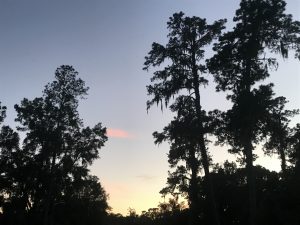15 Time in Nature Activity
Dr. Rachel Yoho
Course: Environmental Health Concepts in Public Health (PHC 4320)
Description
 Time spent in nature is widely understood to have many physical and mental benefits. This extra credit activity helps students to unwind and pause, while engaging their sense of place and spatial awareness. Students are given instruction about the value of time in nature, details of what nature can be, how to receive credit, and references for optional further exploration. Students are asked to take a photo of their nature space and post it in a Canvas discussion board for classmates to see as well.
Time spent in nature is widely understood to have many physical and mental benefits. This extra credit activity helps students to unwind and pause, while engaging their sense of place and spatial awareness. Students are given instruction about the value of time in nature, details of what nature can be, how to receive credit, and references for optional further exploration. Students are asked to take a photo of their nature space and post it in a Canvas discussion board for classmates to see as well.
Assignment Goals/Outcomes
The goal of this activity is to give students a small points activity (or extra credit activity) where they take a moment and pause, while engaging their senses and spatial awareness. This activity is useful for courses where students are focused on the environment, space, or developing specific observational skills, as well as for an extra credit activity in high pressure courses or under stressful external circumstances. The general outcomes of the activity are a photo of a nature place, a few extra credit points, and a few minutes to pause and relax in a chosen nature space.
Assignment Setup (Instructor)
This activity has minimal setup and little time requirement after the activity. The students are provided with the instructions for the time in nature activity below and have the opportunity to explore, reflect, and take a break in their chosen setting or activity.
Student Instructions
Time in Nature Introduction
Time spent in nature generally is understood to have a positive impact on physical health, mental health, and well-being. This week, let’s try to take a short break from the stress of 2020.
Activity
For our activity, please take a couple of minutes out of your week to spend time in nature. This doesn’t have to be anything fancy – no need to go to a park or anything unless that’s what you want or need. Nature can be a small green space, a tree, a potted plant, or a view from a balcony or out a window, if you’re not able or don’t want to go out. Take a moment to relax in this ‘nature place’ you chose. For 5 extra credit points towards the quizzes (that’s two quiz questions!), post a picture of your chosen nature place in this discussion board for others to see as well. Be safe, take care of yourself, and try to take a break in nature this week.
References
Interested in seeing references for this nature-health association? Here are a few examples:
- Cox, D. T., Shanahan, D. F., Hudson, H. L., Fuller, R. A., Anderson, K., Hancock, S., & Gaston, K. J. (2017). Doses of nearby nature simultaneously associated with multiple health benefits. International journal of environmental research and public health, 14(2), 172.
- Hartig, T., van den Berg, A. E., Hagerhall, C. M., Tomalak, M., Bauer, N., Hansmann, R., … & Bell, S. (2011). Health benefits of nature experience: Psychological, social and cultural processes. In Forests, trees and human health(pp. 127-168). Springer, Dordrecht.
- Shanahan, D. F., Fuller, R. A., Bush, R., Lin, B. B., & Gaston, K. J. (2015). The health benefits of urban nature: how much do we need?. BioScience, 65(5), 476-485.
Grading (Instructor/TA)
Grading for this as extra credit or as an activity for points is best based on participation.
Tips and Suggestions for Instructors
This is a great extra credit assignment for students, particularly during a rough time in the semester (around midterms/finals, due to current national/world events, educational disruptions, etc.). I offered five extra credit points for students (equivalent to two quiz questions) for participation. It could also be used as a completion graded activity for courses emphasizing the practice of self-awareness, space, place, or specific observational skills.
Keywords: spatial awareness, outdoor activity, photograph, reflect, nature, observational skills, self-awareness
